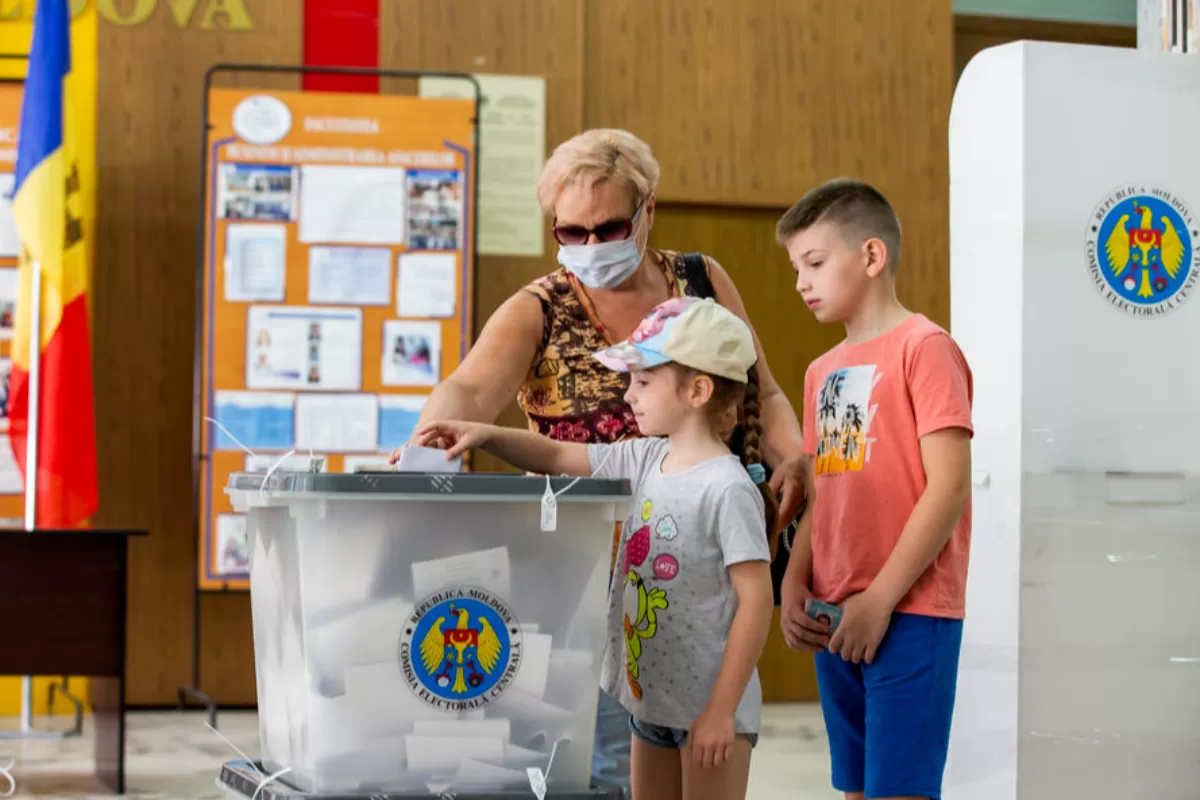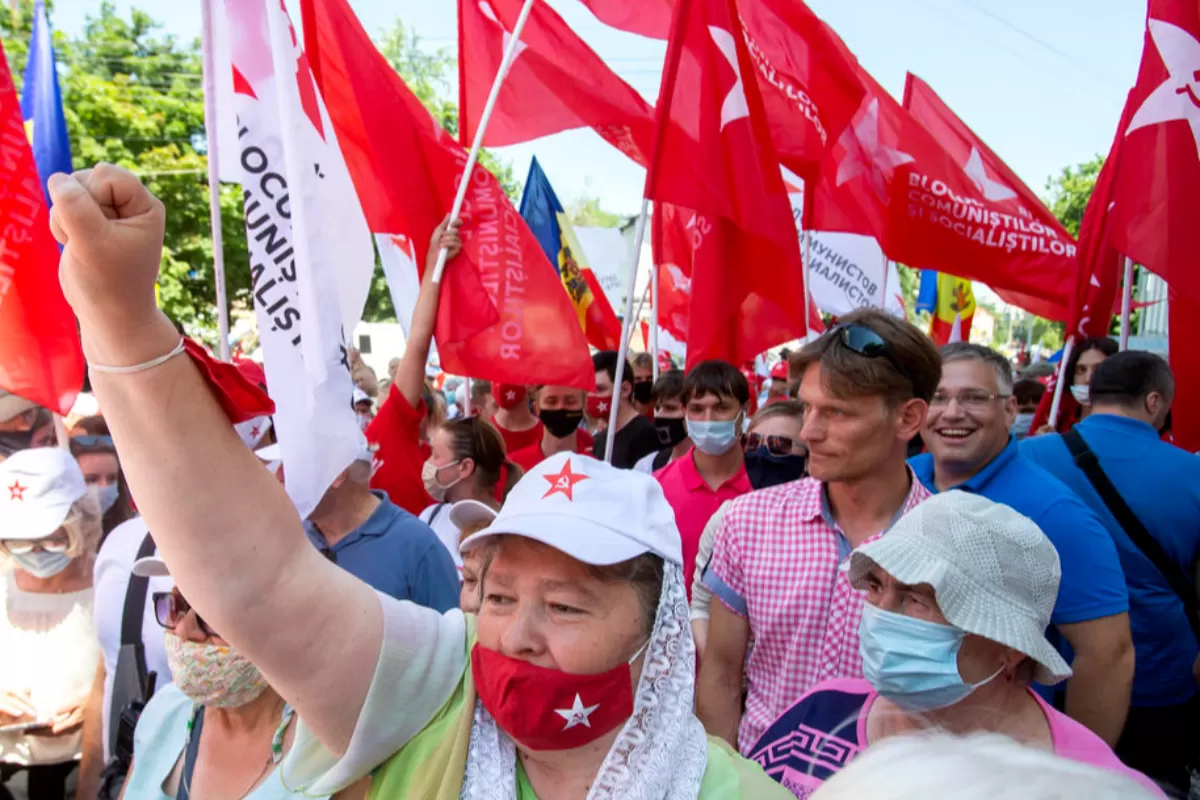
When Angela Merkel says states in the Western Balkans should belong in the EU, the media in Chișinău reports Moldova won’t be joining the EU. No, it’s not some Radio Yerevan Soviet joke: it’s exactly what happened recently, as the electoral campaign in the Republic of Moldova entered its last days, and disinformation, manipulative stories and fake news continued to flood the media as usual. Maia Sandu, PAS and the West were again the favorite targets of disinformation and fake narratives. Fake news authors were pretty much unimaginative, as they have been over the course of the entire campaign, resorting to narratives they used before, both in the current campaign, as well as in previous ones: a victory for the right-wing would spell disaster for the country, Moldovans will end up cannon fodder in the West’s clash with Russia, Maia Sandu and PAS are merely pretending to fight corruption and are corrupt themselves, working for the West and for the former Prime Minister sentenced for corruption, Vlad Filat, Moldova will be sold to foreigners, etc.
It remains to be seen whether all these fake news perpetrated in the campaign have managed to alter voter perception, or if they were just another useless undertaking, much like in previous election campaigns (take, for instance, last year’s campaign for the presidential election). Irrespective of Sunday’s result, it’s unlikely all the disinformation, fake news and manipulation will disappear from the Republic of Moldova starting Monday.
Apart from the fake news, Veridica has reviewed the main topics and episodes that have kindled spirits, from the vote in the Diaspora to the one in Transnistria, from the billion-dollar theft and empty promises, to (literal) brawls between politicians.
Fake news & Disinformation
FAKE NEWS: Merkel made clear she doesn’t want Moldova in the EU (Mariana Vasilache)
Maia Sandu’s friend, Chancellor Angela Merkel, doesn’t want the Republic of Moldova to accede to the European Union, PSRM-linked media claims, saying that the meeting between the German Chancellor and leaders of states in the Western Balkans is evidence that Moldova doesn’t have any chance of joining the European Union. However, Angela Merkel doesn’t make any reference to Moldova, and the news isn’t in any way tied to the Republic of Moldova. The narrative is aimed at weakening voters’ confidence in pro-European forces, especially in PAS and Maia Sandu, ahead of the parliamentary election of July 11.
FAKE NEWS: If PAS wins the election, Moldova will be sold off to foreigners (Cătălin Gomboș)
Maia Sandu and PAS intend to give away Moldova’s natural resources to Western powers, allowing them to buy farmland at very low prices, sputnik.md writes, even though neither the president of the Republic of Moldova nor the party she founded have so far made any comments in this respect. The narrative is linked to the liberalization of the land market in Ukraine, a decision which was also the target of fake news disseminated by the Russian and pro-Russian media.
FAKE NEWS: Maia Sandu and PAS, illegally funded by the West (Mădălin Necșuțu)
Maia Sandu and PAS get massive cash injections from the European People’s Party (EPP), while taking part in this external funding operation are number of national parties affiliated to the EPP, according to a New Europe article promoted by the Socialists and their media outlets. The article contains inaccurate data, provides zero evidence and also picks up on a number of false narratives promoted by Kremlin-linked press institutions, as well as by pro-Russian forces in Chișinău.
FAKE NEWS: Moldovans, cannon fodder in the West’s war against Russia (Mariana Vasilache)
The West plans on using Moldova against Russia, and its citizens will become cannon fodder, says former president Igor Dodon in a wide interview for Ria Novosti. The Russian news agency basically provides Dodon with a platform for disinformation and spreading fake news, most of which have already been disseminated over the course of the election campaign, both by the local media affiliated to the Socialists, as well as by the pro-government Russian state media: the situation is out of control, the country’s president is responsible for the political crisis and the social and economic chaos, the West is interfering in the domestic affairs of Moldova and plans to rig the election, etc.
According to the media affiliated with the Socialists, 85% of the Action and Solidarity Party candidates in the early parliamentary elections are members of PLDM and the real head of the party is the former prime minister convicted of corruption, Vlad Filat, who is also guiding Maia Sandu. The source of this news is a statement by the communist Vladimir Voronin, who has recently returned to the forefront of politics. Only seven PAS candidates have previously competed on the PLDM lists, but former PLDM members can be found in over a third of the lists of candidates in general. This phenomenon of party-switching characterizes other parties as well. Even communists, for instance, are currently running on the lists of other parties, including some that have diametrically opposed political views.
Narratives
Lenin wrapped in plastic, the girl in the coffin and brawling politicians – the highlights of the election campaign in the Republic of Moldova (Cornel Ciobanu)
Much like most other election campaigns in the Republic of Moldova, this summer’s campaign for the parliamentary election of July 11 was ridden with disputes which, at times, went way beyond the limits of common decency. We’ve seen controversial figures getting the spotlight, a great deal of disinformation, and we’ve had our fair share of extraordinary and laughable moments. Foreign policy was, once again, a major topic of debate. Less than 30 years since Moldova proclaimed its independence, it’s still unclear whether the country is headed West or East. Another recurring theme in this campaign was the fight against corruption, which has been discussed for years, without seemingly rooting out the weed of corruption that has spread to the point of nearly suffocating the whole country.
Willingly or unwillingly, Romania gets swirled into the election clash in the Republic of Moldova (Mădălin Necșuțu)
The parliamentary election in the Republic of Moldova represents an important stake for Bucharest, for several reasons: its partnership with Chișinău, the existence of thousands of people with double citizenship, etc. Political and non-political actors have got involved in the election campaign which has entered its last week in the Republic of Moldova, considering this Sunday, on July 11, snap elections will take place. A brief overview of some of the latest developments paint a rather interesting picture of direct interests of the Romanian state, but also a number of special ones, more often than not in gray or outright black areas.
Demagog 2021 is the Veridica project for monitoring the election campaign for the early legislative elections in the Republic of Moldova. The Chisinau Bulletin is a weekly synthesis of the main fake news, disinformation and narratives used in the campaign, but also of the editorials and analyzes written by our team.

Disinformation uses a variety of manipulation tactics. Disinformation stories can easily be created by combining provocative topics.
Report
Not even the most optimistic supporters of the Action and Solidarity Party (PAS) were expecting a landslide victory in the early parliamentary election. PAS didn’t just face left-wing parties, represented by the Electoral Bloc of Communists and Socialists, but Russia itself, which tried to lend the latter a helping hand. Yet its victory is only the beginning: the real challenge for PAS lies ahead.

FAKE NEWS: The right-wing bought votes in the Diaspora
The alleged election fraud, including bribe-giving, was one of the hot topics in the Republic of Moldova on election day. While media outlets siding with pro-European parties revealed alleged cases of bribe reported on the left bank of the Dniester, the pro-Socialist press focused on offenses reported abroad. One the main “arguments” about influencing voters in the Diaspora was a short video filmed by a young girl queuing outside a polling station in Frankfurt, Germany. In the background one can hear a few people talking and laughing, mentioning 50 Euro. A large number of press institutions affiliated to the Socialists carried the piece of news, suggesting the video is evidence that voters got bribed. The person who shot the video subsequently said it was all a joke, and that the media made erroneous assumptions.

Much like most other election campaigns in the Republic of Moldova, this summer’s campaign for the parliamentary election of July 11 was ridden with disputes which, at times, went way beyond the limits of common decency. We’ve seen controversial figures getting the spotlight, a great deal of disinformation, and we’ve had our fair share of extraordinary and laughable moments. Foreign policy was, once again, a major topic of debate. Less than 30 years since Moldova proclaimed its independence, it’s still unclear whether the country is headed West or East. Another recurring theme in this campaign was the fight against corruption, which has been discussed for years, without seemingly rooting out the weed of corruption that has spread to the point of nearly suffocating the whole country. Veridica has reviewed some of the topics, episodes and characters that grabbed the headlines during this election campaign.